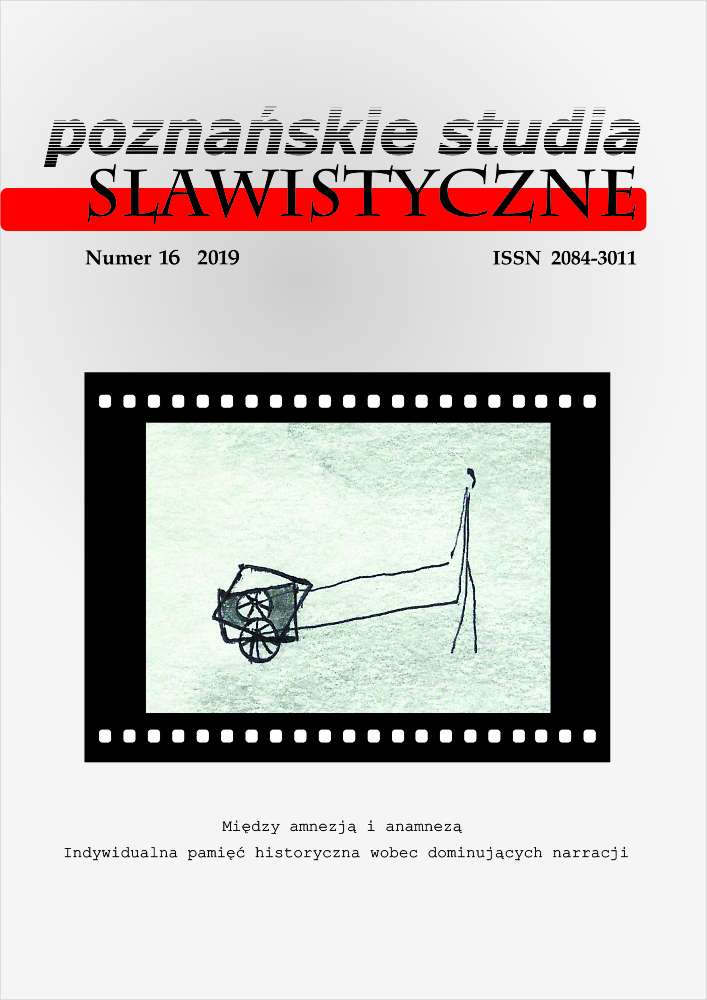Abstract
In times of violent conflicts, societies tend to promote narratives that enable successful coping with the situation. Official collective memory can thus provide foundation for a group’s belonging, mobilization, persistence. On the other hand, it often perpetuates the animosity by, for example, delegitimizing (and often dehumanizing) the other side. In this article, we explore whether unofficial personal memories of a violent conflict could mitigate the damage in intergroup relations done by the dominating narratives. We conducted a secondary thematic analysis of 38 interviews with civilians and soldiers in the Post-Yugoslav wars (1991–1995). The themes we report here offer deeply personal and humanizing accounts of the war experience, which have largely remained outside traditional historiography.References
Baker, K.M. (1985). Memory and practice: Politics and the representation of the past in eighteenth-century France. „Representations“ 11, str. 134–164. https://doi.org/10.2307/2928429
Bar-Tal, D. (2000). Shared beliefs in a society: Social psychological analysis. Tho¬usand Oaks, CA, US: Sage Publications, Inc.
Bar-Tal, D., Rosen, Y. (2009). Peace education in societies involved in intractable con¬flicts: Direct and indirect models. „Review of Educational Research“ 79(2), str. 557–575. https://doi.org/10.3102/0034654308330969
Bartlett, F.C. (1932). Remembering: A study in experimental and social psychology. Cambridge, England: Cambridge University Press.
Boraine, A. (2000). A country unmasked: Inside South Africa’s Truth and Reconcilia¬tion Commission. Oxford: Oxford University Press.
Cairns, E., Roe, M.D. (eds.). (2003). Memories in conflict. London: Macmillan.
Cakal, H., Petrović, N. (2017). Intergroup contact and ingroup identification as pre¬dictors of intergroup attitudes and forgiveness in the Serbian context: The mode¬rating role of exposure to positive information. „Primenjena psihologija“ 10(4), str. 477–497. https://doi.org/10.19090/pp.2017.4.477-497
Ebbinghaus, H. (1913). Memory. Trans. H.A. Ruger, C.E. Bussenius. New York: Teachers College [Original work published 1885].
Gojković, D. (2005). Ljudi u ratu: Govore žene: Ne bilo ga nikad i nigdje. Beograd: Dokumentacioni centar Ratovi 1991–1999.
Gojković, D., Bašić, N., Delić, V. (ur.). (2003). Ljudi u ratu: Sudbine civila 1. Beograd: Dokumentacioni centar Ratovi 1991–1999.
Gojković, D., Bašić, N., Delić, V. (ur.). (2004). Ljudi u ratu: Ratovanja 2. Beograd: Dokumentacioni centar Ratovi 1991–1999.
Gojković, D., Bašić, N. (ur.). (2004a). Ljudi u ratu: Ratovanja 1. Beograd: Dokumen¬tacioni centar Ratovi 1991–1999.
Gojković, D., Bašić, N. (ur.). (2004b). Ljudi u ratu: Ratovanja 3. Beograd: Dokumen¬tacioni centar Ratovi 1991–1999.
Halbwachs, M. (1980). The collective memory. New York: Harper Colophon.
Kostovicova, D. (2016). Seeking justice in a divided region: Text analysis of regional civil society deliberations in the Balkans. „International Journal of Transitional Justice“ 11(1), str. 154–175. https://doi.org/10.1093/ijtj/ijw023
Kunda, Z. (1990). The case for motivated reasoning. „Psychological Bulletin“ 108(3), str. 480–498. https://doi.org/10.1037/0033-2909.108.3.480
László, J. (2013). Historical tales and national identity: An introduction to narrative social psychology. London: Routledge. https://doi.org/10.4324/9781315880105
Loftus, E.F. (1979). The malleability of human memory: Information introduced after we view an incident can transform memory. „American Scientist“ 67(3), str. 312–320.
Neisser, U. (ed.). (1982). Memory observed: Remembering in natural contexts. New York: W.H. Freeman.
Petrović, N. (2007). Kolektivna sećanja i perspektive poslekonfliktne modernizacije. U: T. Cipek, O. Milosavljević, 1918: Kultura sjećanja: Povijesni lomovi i svlada¬vanje prošlosti. Zagreb: Disput.
Pettigrew, T.F., Tropp, L.R. (2006). A meta-analytic test of intergroup contact theory. „Journal of Personality and Social Psychology“ 90(5), str. 751–783. https://doi.org/10.1037/0022-3514.90.5.751
Petty, R.E., Cacioppo, J.T. (1986). Communication and persuasion. New York: Sprin¬ger. https://doi.org/10.1007/978-1-4612-4964-1
Tajfel, H., Turner, J.C. (1986). The social identity theory of intergroup behavior. U: S. Worchel, W.G. Austin (eds.), Psychology of intergroup relations. Chicago: Nelson-Hall, str. 7–24.
Truth and Reconciliation Commission of South Africa Report. (1998). Vol. 1–5. Cape Town: TRC.
License

This work is licensed under a Creative Commons Attribution-NoDerivatives 4.0 International License.

